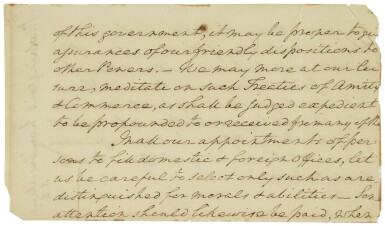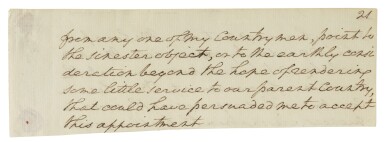WASHINGTON, George. Autograph manuscript fragment, comprising four pages from his "Compend of Husbandry," a notebook containing observations on agriculture and husbandry, n.p. [Mount Vernon], n.d. [1790s]. 2 pages, 12mo (6 7/16 x 3 15/16 in.), a single leaf from a pocket-size notebook, paginated "15" and "16" by Washington in upper corners. In excellent condition. GEORGE WASHINGTON, SCIENTIFIC FARMER. A LEAF FROM HIS "HUSBANDRY NOTEBOOK" A rare leaf from a small-format notebook in which Washington collected advice and techniques from modern agricultural writers including the English agriculturists Jethro Tull, Arthur Young, Edward Lisle and Thomas Hale, whose agricultural reforms were referred to as the "new husbandry." Many of these modern precepts, techniques and inventions (such as the plow referred to in the present text) were put into practice at Mount Vernon, which served the former President as an experimental farm. Initially, when he took over Mount Vernon, Washington followed the path of other Virginia planters who cultivated tobacco for export to Great Britain. But as he soon discovered, tobacco was hardly an ideal cash crop, nor was the clay soil of Mount Vernon very suitable for its cultivation. When a glutted market resulted in a sharp decline in the wholesale price of tobacco in the 1760s, "Washington found his dependance upon a single cash export to the mother country unacceptable on economic, and, increasingly, on political grounds" (A. and D.J. Fusonie, George Washington: Pioneer Farmer , p.9). From about 1764 on, Washington experimented a variety of new crops, especially grains: wheat, corn, hops and oats, as well as hemp and flax and he eventually raised over 60 different crops at Mount Vernon. "Washington's preoccupation with and love of farming at Mount Vernon was complemented by his national vision for the future of agriculture in the new America" ( ibid ., p.55). The present leaf contains complex recipes and instructions for soaking seeds (wheat, barley, corn) in a complex liquor or "pickle" to make the seed unpalatable to rodents, insects and birds and to encourage germination. In his careful note-taking from these sources, Washington is careful to note chapter and page references for passages he is extracting: "Chap. X 122: It is best to mix a little at a time only, & when it grows too dry, sprinkle a little liq[ue]r over it again, until you enlarge the grains to the size you would wish.- the larger the better.- 123: The same pickle, powder & management will do for any sort of Corn, seed or grain, that you would sow in the manner as described with his new invented transplanting machine particularly wheat and Barley. Some mix old & New Turnip seed together to avoid injury by the Fly - but he recommends, in preference, to sow one half the seed steeped & managed as before directed - and the other half in its natural state.- Pages 119 & 120." "Chap: XII General Pickles, for Wheat. 127: For farmers who sow great [quantities?] and will not go to the expense of the above pickle. Take a fair Hogshead; let it into the ground with its top even with the surface in some by place, having a cover [illegible]. In this keep Chamber lees from one seed time to another; the older it is the better; in this throw all the Bullocks, sheep, Hogs or any other sort of galls you can get - the more the better. In each hogshead full of liquor put two gallons of train Oil, a great many heads of Garlick bruized one tb. of Copperas, one pd. of Nitre & one [?] of bay salt. Steep the seed therein eight hours & skim off all the light seed that swims at top,, then take it out, & on a floor mix with it quick lime & soot, of each an equal quantity, till it be of a consistency proper for sowing. It is a mistaken opinion that none but new wheat will grow - old is rather better than new, particularly if steeped in this pickle.- and were they to com-..." Provenance : George Washington -- Bushrod Washington, his nephew, who inherited Mo
WASHINGTON, George. Autograph manuscript fragment, comprising four pages from his "Compend of Husbandry," a notebook containing observations on agriculture and husbandry, n.p. [Mount Vernon], n.d. [1790s]. 2 pages, 12mo (6 7/16 x 3 15/16 in.), a single leaf from a pocket-size notebook, paginated "15" and "16" by Washington in upper corners. In excellent condition. GEORGE WASHINGTON, SCIENTIFIC FARMER. A LEAF FROM HIS "HUSBANDRY NOTEBOOK" A rare leaf from a small-format notebook in which Washington collected advice and techniques from modern agricultural writers including the English agriculturists Jethro Tull, Arthur Young, Edward Lisle and Thomas Hale, whose agricultural reforms were referred to as the "new husbandry." Many of these modern precepts, techniques and inventions (such as the plow referred to in the present text) were put into practice at Mount Vernon, which served the former President as an experimental farm. Initially, when he took over Mount Vernon, Washington followed the path of other Virginia planters who cultivated tobacco for export to Great Britain. But as he soon discovered, tobacco was hardly an ideal cash crop, nor was the clay soil of Mount Vernon very suitable for its cultivation. When a glutted market resulted in a sharp decline in the wholesale price of tobacco in the 1760s, "Washington found his dependance upon a single cash export to the mother country unacceptable on economic, and, increasingly, on political grounds" (A. and D.J. Fusonie, George Washington: Pioneer Farmer , p.9). From about 1764 on, Washington experimented a variety of new crops, especially grains: wheat, corn, hops and oats, as well as hemp and flax and he eventually raised over 60 different crops at Mount Vernon. "Washington's preoccupation with and love of farming at Mount Vernon was complemented by his national vision for the future of agriculture in the new America" ( ibid ., p.55). The present leaf contains complex recipes and instructions for soaking seeds (wheat, barley, corn) in a complex liquor or "pickle" to make the seed unpalatable to rodents, insects and birds and to encourage germination. In his careful note-taking from these sources, Washington is careful to note chapter and page references for passages he is extracting: "Chap. X 122: It is best to mix a little at a time only, & when it grows too dry, sprinkle a little liq[ue]r over it again, until you enlarge the grains to the size you would wish.- the larger the better.- 123: The same pickle, powder & management will do for any sort of Corn, seed or grain, that you would sow in the manner as described with his new invented transplanting machine particularly wheat and Barley. Some mix old & New Turnip seed together to avoid injury by the Fly - but he recommends, in preference, to sow one half the seed steeped & managed as before directed - and the other half in its natural state.- Pages 119 & 120." "Chap: XII General Pickles, for Wheat. 127: For farmers who sow great [quantities?] and will not go to the expense of the above pickle. Take a fair Hogshead; let it into the ground with its top even with the surface in some by place, having a cover [illegible]. In this keep Chamber lees from one seed time to another; the older it is the better; in this throw all the Bullocks, sheep, Hogs or any other sort of galls you can get - the more the better. In each hogshead full of liquor put two gallons of train Oil, a great many heads of Garlick bruized one tb. of Copperas, one pd. of Nitre & one [?] of bay salt. Steep the seed therein eight hours & skim off all the light seed that swims at top,, then take it out, & on a floor mix with it quick lime & soot, of each an equal quantity, till it be of a consistency proper for sowing. It is a mistaken opinion that none but new wheat will grow - old is rather better than new, particularly if steeped in this pickle.- and were they to com-..." Provenance : George Washington -- Bushrod Washington, his nephew, who inherited Mo



.jpg)











Try LotSearch and its premium features for 7 days - without any costs!
Be notified automatically about new items in upcoming auctions.
Create an alert